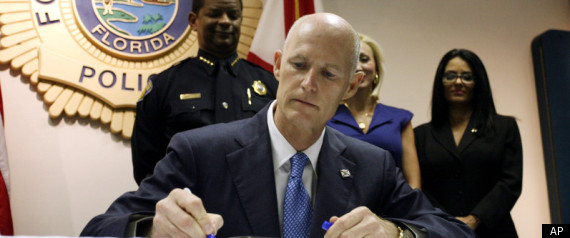 Florida's largest teachers union filed suit on Monday to stop the enactment of new pension reform laws, the first lawsuit of potentially many that seek to halt the Sunshine State's education agenda.
Florida's largest teachers union filed suit on Monday to stop the enactment of new pension reform laws, the first lawsuit of potentially many that seek to halt the Sunshine State's education agenda."The state has taken an ax to the budget instead of a scalpel," said Andy Ford, president of the Florida Education Association (FEA), in an interview with The Huffington Post. "They're turning their backs on teachers, law enforcement, firefighters, nurses. It's not the way to go."
Florida's Republican legislature passed a bill in April that requires state employees to contribute 3 percent of their salaries to their pension plans. The legislation, championed by Republican Gov. Rick Scott, passed along party lines with Democrats calling it an income tax.
This law, Ford said, is one of many passed this legislative session that his group opposes. "We have been analyzing all the issues that came about as a result as this session and we're continuing to look at many other issues for future suits potentially," he said. Ford specifically mentioned class size changes, using standardized tests for 50 percent of teacher evaluations and merit pay for teachers as issues the FEA might potentially protest in court "down the road, over the next few weeks."
Florida joined many states in passing sweeping education bills this legislative session. These laws, including Florida's, often tied teacher pay with performance on standardized tests.
"There are issues revolving around collective bargaining and the changes in the scope of bargaining in this education bill that we've had a problem with because we have a constitutional right to bargain for sound wages and conditions of employment," Ford said. "The evaluation is a condition of employment and now it's a condition of the salary."
The pension reform package could have been averted by taxes, according to the FEA president. "Even in this year, they gave more tax cuts," he said. "They continued to reduce the revenue to the state and claimed it's a budget shortfall."
The lawsuit filed Monday alleges that the pension law is unconstitutional, breaking with a legal contract established in 1974 that makes pensions noncontributory. Ron Meyer, the lawyer representing the FEA in the suit, said a hearing scheduled for next Thursday will weigh their requested injunction of the law. The FEA's injunction request seeks to hold the first 3 percent that would be removed from salaries this year in a fund that would be restored to teachers' salaries should the union ultimately win.
Full Article
Source: Huffington
No comments:
Post a Comment